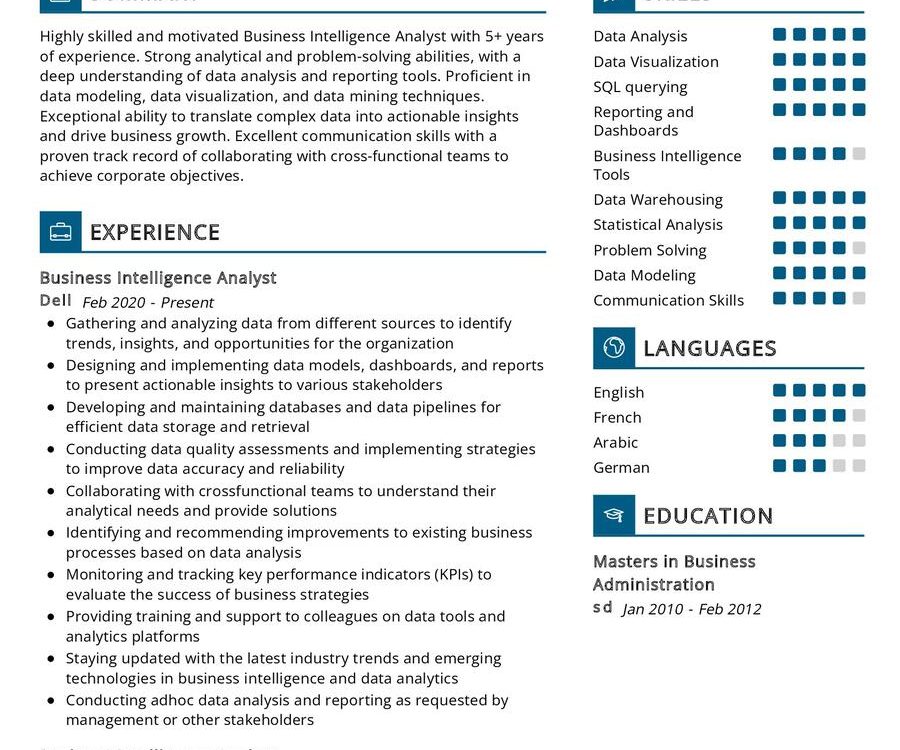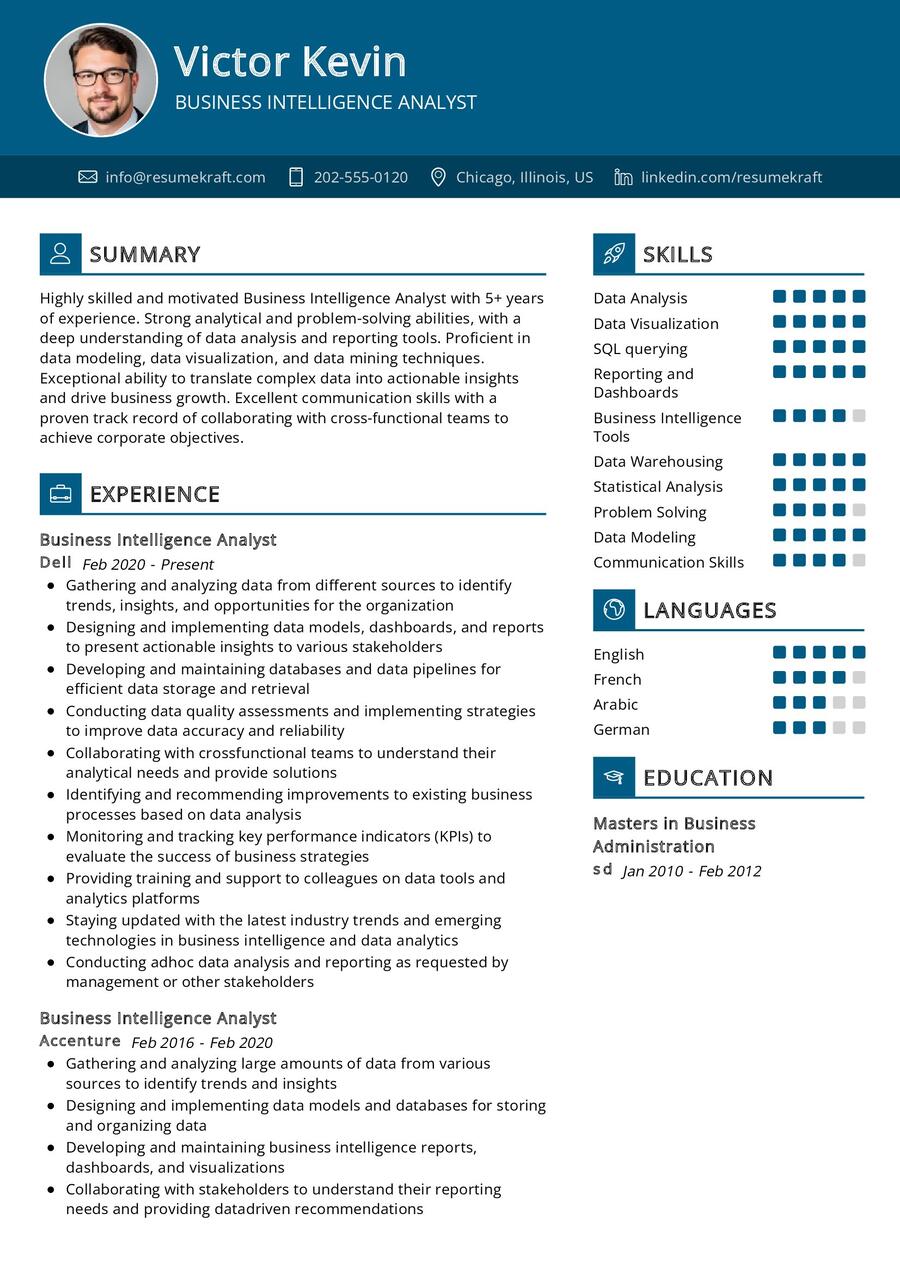Unlocking Success: The Role of a Business Intelligence Analyst
In today’s data-driven world, the position of a Business Intelligence Analyst holds paramount importance in organizations seeking to gain a competitive edge. This role seamlessly blends analytical prowess with strategic insight, playing a pivotal role in shaping the decision-making processes within a company. Let’s delve into the multifaceted responsibilities and requirements that define the role of a Business Intelligence Analyst, a profession at the intersection of data mastery and business strategy.
What are the Business Intelligence Analyst Job Requirements?
Embarking on a journey as a Business Intelligence Analyst demands a comprehensive skill set and a solid educational foundation. To excel in this role, consider the following prerequisites:
- A Bachelor’s or Master’s degree in Business, Statistics, Computer Science, or a related field, showcasing a strong foundation in data analysis.
- Proficiency in data visualization tools like Tableau, Power BI, or QlikView, demonstrating an ability to translate complex data into actionable insights.
- Experience with data warehousing and ETL processes, showcasing a deep understanding of data integration.
- Advanced skills in SQL for querying databases and extracting meaningful information.
- Strong business acumen, enabling the translation of data insights into strategic recommendations.
- Excellent communication skills, both verbal and written, to effectively convey insights to non-technical stakeholders.
- Problem-solving abilities and attention to detail, ensuring accuracy in data analysis and reporting.
Attaining certifications in data analytics or business intelligence can enhance your profile, demonstrating a commitment to staying at the forefront of industry trends.
What are the Responsibilities of a Business Intelligence Analyst?
The role of a Business Intelligence Analyst is a dynamic blend of technical expertise and business strategy. Here are the core responsibilities that define this position:
- Collecting and analyzing business data to identify trends, patterns, and insights that can drive informed decision-making.
- Designing and developing dashboards and reports to visually represent complex data sets for easy interpretation by stakeholders.
- Collaborating with cross-functional teams to understand business requirements and provide data-driven solutions.
- Building and maintaining data models and databases to support ongoing analytical needs.
- Conducting regular data audits to ensure accuracy, completeness, and reliability of business intelligence reports.
- Staying abreast of emerging technologies and trends in business intelligence to recommend and implement improvements in processes and tools.
- Providing training and support to end-users to foster a culture of data-driven decision-making throughout the organization.
Each responsibility is a thread in the tapestry of a Business Intelligence Analyst’s role, weaving together technical proficiency and strategic thinking.
Business Intelligence Analyst Resume Writing Tips
Crafting a compelling resume is crucial to stand out in the competitive landscape of business intelligence. Here are some tips to create a resume that highlights your strengths effectively:
- Emphasize your experience with specific BI tools and technologies, showcasing your hands-on expertise.
- Quantify your achievements, using metrics to demonstrate the impact of your data-driven insights on business outcomes.
- Highlight instances where you’ve successfully translated complex technical concepts into understandable insights for non-technical stakeholders.
- Showcase your ability to work collaboratively by detailing projects where you collaborated with diverse teams to achieve common goals.
- Include any relevant certifications or training programs you’ve completed, underscoring your commitment to continuous learning in the field.
Your resume is your professional narrative, and each section should tell a story of your expertise and achievements as a Business Intelligence Analyst.
Business Intelligence Analyst Resume Summary Examples
Your resume summary is the first glimpse employers get into your capabilities. Craft a powerful summary that encapsulates your experience and value proposition:
- “Results-driven Business Intelligence Analyst with a proven track record of transforming raw data into actionable insights, driving a 15% increase in operational efficiency.”
- “Detail-oriented BI Analyst with expertise in data visualization tools, leveraging analytical skills to streamline decision-making processes and enhance business performance.”
- “Experienced Business Intelligence Analyst adept at translating complex data sets into strategic recommendations, contributing to a 20% revenue growth in the past fiscal year.”
Each summary is a snapshot of your potential contributions, setting the stage for a deeper exploration of your skills and experiences.
Create a Strong Experience Section for Your Business Intelligence Analyst Resume
Your experience section is the crux of your resume, illustrating your journey and impact as a Business Intelligence Analyst:
- “Led a cross-functional team in implementing a data warehouse solution, resulting in a 30% reduction in reporting time and improved data accuracy.”
- “Developed and maintained interactive dashboards, providing real-time insights that guided executive decisions and led to a 25% increase in sales.”
- “Collaborated with marketing and sales teams to identify customer behavior patterns, leading to targeted campaigns and a 15% growth in customer engagement.”
Each experience is a chapter in your professional story, showcasing your ability to drive positive outcomes through data analysis.
Sample Education Section for Your Business Intelligence Analyst Resume
Your educational background adds credibility to your expertise. Structure your education section like this:
- Master of Business Administration in Business Analytics, XYZ University, equipped with advanced analytical skills and strategic thinking, 2018.
- Bachelor of Science in Computer Science, ABC University, providing a solid foundation in data management and analysis, 2015.
- Certified Business Intelligence Professional (CBIP), demonstrating specialized knowledge in the field, 2019.
Each educational milestone is a building block in your journey towards becoming a proficient Business Intelligence Analyst.
Business Intelligence Analyst Skills for Your Resume
Your skill set is your toolkit, showcasing the diverse abilities you’ve honed over the years. Here are the essential skills for a Business Intelligence Analyst:
Technical Skills:
- Proficiency in data visualization tools (Tableau, Power BI, QlikView).
- Advanced SQL for querying and analyzing databases.
- Data warehousing and ETL processes.
- Experience with BI reporting tools and platforms.
Soft Skills:
- Excellent communication and presentation skills.
- Problem-solving and critical thinking abilities.
- Attention to detail and accuracy in data analysis.
- Business acumen and strategic thinking.
Each skill is a tool in your arsenal, contributing to your effectiveness as a Business Intelligence Analyst.
Most Common Mistakes to Avoid When Writing a Business Intelligence Analyst Resume
Steer clear of common pitfalls to ensure your resume effectively showcases your qualifications:
- Avoid using generic language; tailor your resume to the specific job description to highlight your suitability for the role.
- Focus on achievements rather than duties, showcasing the impact of your work rather than listing routine tasks.
- Don’t neglect the importance of a cover letter; use it as an opportunity to convey your passion for business intelligence and your fit for the role.
- Keep technical jargon to a minimum; ensure your resume is accessible to both technical and non-technical audiences.
- Thoroughly proofread your resume to present a polished and professional image to potential employers.
Avoiding these mistakes ensures your resume stands out for all the right reasons, increasing your chances of landing your dream job as a Business Intelligence Analyst.
Key Takeaways for Your Business Intelligence Analyst Resume
As we conclude this comprehensive guide, here are key takeaways to keep in mind while crafting your Business Intelligence Analyst resume:
- Highlight your proficiency in BI tools and technologies, emphasizing your ability to turn data into actionable insights.
- Showcase quantifiable achievements, using metrics to demonstrate the impact of your work on operational efficiency, revenue growth, or other key performance indicators.
- Illustrate your collaboration skills by detailing projects where you worked with diverse teams to achieve common business goals.
- Include relevant certifications and training programs to showcase your commitment to continuous learning in the dynamic field of business intelligence.
Remember, your resume is more than a document; it is a narrative of your professional journey, a testament to your skills, and an invitation for prospective employers to envision the value you bring to their organization. Best of luck!
Finally, feel free to utilize resources like AI Resume Builder, Resume Design, Resume Samples, Resume Examples, Resume Skills, Resume Help, Resume Synonyms, and Job Responsibilities to create a standout application and prepare for the Business Intelligence Analyst job interview.


